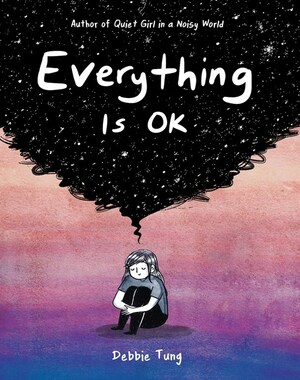
Everything is OK
by Debbie Tung
Genres: Graphic Novels, Memoir, Non-fictionPages: 184
Rating:

Synopsis:Everything Is OK is the story of Debbie Tung’s struggle with anxiety and her experience with depression. She shares what it’s like navigating life, overthinking every possible worst-case scenario, and constantly feeling like all hope is lost.
The book explores her journey to understanding the importance of mental health in her day-to-day life and how she learns to embrace the highs and lows when things feel out of control. Debbie opens up about deeply personal issues and the winding road to recovery, discovers the value of self-love, and rebuilds a more mindful relationship with her mental health.
In this graphic memoir, Debbie aims to provide positive and comforting messages to anyone who is facing similar difficulties or is just trying to get through a tough time in life. She hopes to encourage readers to be kinder to themselves, to know that they are not alone, and that it’s okay to be vulnerable because they are not defined by their mental health struggles. The dark clouds won’t be there forever. Everything will turn out all right.
Debbie Tung’s Everything is OK is a journey through the artist’s experience of depression and anxiety, interspersed with one-page spreads illustrating various “inspirational” phrases and hints about dealing with anxiety and depression. Her art is cute, and she makes good use of colour to bring across the right moods.
I don’t want to critique someone else’s journey with mental health problems. And I’m sure there are people who’ve found this uplifting and helpful in their own journey — many of the things she says are good sense.
What it isn’t is a handbook to recovery from anxiety and depression, even though at times it’s phrased as general advice to everyone. For anyone whose situation is different or very complex, though, it risks coming across just as hackeyed and tone-deaf as the voices Tung depicts as bringing her down (people who say “just get over it”, “you’re doing this for attention”, etc). It’s no universal panacea, and there are many people for whom basic therapy doesn’t help, or doesn’t help enough. The journey she depicts in this book is an incredibly lucky one — which is great for her, but isn’t the answer to all the mental health problems in quite the way that some reviewers think. Just as it’s not as simple as “pull yourself together”, it’s also not as simple as “stop criticising yourself and learn to live with your flaws”.
Which, to be scrupulously fair, Tung doesn’t say — but nor does she really address it. The book does mention different journeys, but it doesn’t touch on the absolute depths. I wouldn’t give this to someone to help them “understand” depression, because it can’t do that job. I’d give it to Debbie Tung’s friends and family, to help them understand her depression and anxiety, and if someone identifies with the picture of depression in these pages, no doubt it can be useful in the same way. But please, for the love of chickens, don’t give it out as a general instruction book, please.
Rating: 2/5

The danger in books like this — though I’m not saying it applies to this one, as I’ve not read it — is that dwelling on one’s feelings can often make them worse. (Speaking from personal experience.) I found it’s better to let them go — let them pass by like clouds — rather than focus on them and let them grow and grow until everything is dark, overcast, and gloomy.
That’s definitely one risk with certain types of mental illness — though sometimes toxic positivity can be just as bad. Sometimes the bad stuff needs acknowledging and talking out, else it’ll fester.